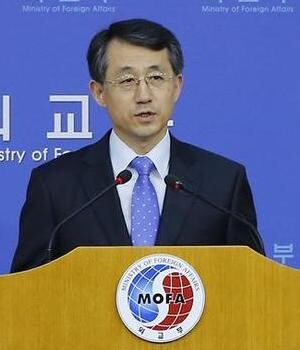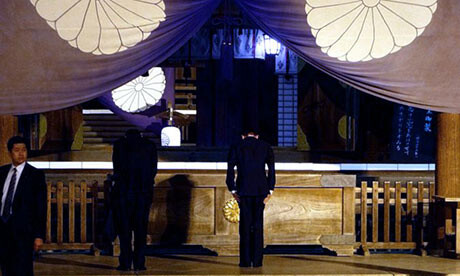hankyoreh
Links to other country sites 다른 나라 사이트 링크
Foreign minister’s Japan trip cancelled after visits to Yasukuni shrine

By Park Byong-su, staff reporter and Jeong Nam-ku, Tokyo correspondent
Korea-Japan relations, which the new South Korean administration has been so carefully seeking to rebuild, have once again hit a snag. After visits by several Japanese cabinet members to the Yasukuni Shrine, the South Korean government issued a strongly worded complaint on Apr. 22 and canceled plans for South Korean Foreign Minister Yun Byung-se to visit Japan the following weekend. It appears that a chill in relations between South Korea and Japan may well be unavoidable for the time being.
“Minster Yun was scheduled to visit Japan from Apr. 26 to Apr. 27 for talks with Japanese Foreign Minister Fumio Kishida,” a source at the South Korean Ministry of Foreign Affairs said. “The plan was to discuss how to improve relations between South Korea and Japan under the new government, but since Japanese cabinet members visited the Yasukuni Shrine, we decided that it would be difficult for productive discussions to take place.”
“We express our deep concern and regret concerning the Japanese Prime Minister sending a tribute to the Yasukuni Shrine and the deputy prime minister and other current cabinet members paying their respects at the shrine,” said Ministry of Foreign Affairs spokesperson Cho Tae-young. He urged Japan to immediately stop “backward behavior that displays an ignorance of history.”
Three Japanese cabinet-level officials, including Taro Aso, Japanese deputy prime minister and finance minister, recently paid their respects at the Yasukuni Shrine during the spring festival held there. The shrine honors the spirits of the Japanese soldiers who died in the wars of aggression waged by the Japanese empire. Japanese Prime Minister Shinzo Abe sent a potted tree as an official tribute to the shrine.
Because of Aso and other Japanese officials’ visits to the Yasukuni Shrine, South Korean President Park Geun-hye’s relations with Japan are facing an impasse at the beginning of her term. Considering the sensitive nature of certain upcoming dates, including the election in the Japanese Upper House in July and the holiday marking Korea’s independence from Japan on Aug. 15, it is unlikely that a summit for the leaders of South Korea and Japan will be scheduled in the near future. Such a summit has yet to take place since Park came into office.
“When the ‘big three’ cabinet members - the prime minister, chief cabinet secretary, and foreign minister - paid a visit to the shrine, we thought it was a big problem,” said an official at the South Korean foreign ministry. “And then Aso, the Deputy Prime Minister, who is a major power broker in Japanese politics, visited as well. This came in spite of the objections of the South Korean government, and it was after the schedule of Yun’s visit to Japan had already been confirmed. It was a matter of principle and trust, and we could not just look the other way.”
The Japanese government tried to downplay the visits to the shrine, claiming that the officials had gone in a private capacity.
“The government will not make any statements in regard to the private actions of cabinet members,” said Yoshihide Suga, chief cabinet secretary of Japan.
In regard to South Korea’s decision to cancel the talks, Suga said, “No decisions had been made about the exact schedule of the talks. Each country has its own position. Issues such as paying respects at the shrine must not have too great of an effect on diplomacy.”
Analysts regard Aso’s decision to visit the controversial Yasukuni Shrine on Apr. 21 as a strategic move aimed at consolidating the conservatives in preparation for the elections for the Japanese upper house in Jul. 2013.
Immediately after former South Korean President Lee Myung-bak’s sudden visit to Dokdo in Aug. 2012, various cabinet members from the Democratic Party of Japan paid respects at the Yasukuni Shrine in what they said was “a private capacity.”
Shortly before the election in Dec. 2012, Abe had hinted that he would pay his respects at the shrine if he became prime minister. It appears that the Abe government decided that they needed to take further action.
But with Aso’s visit to the shrine having a negative effect on Japan’s relations with South Korea, some members of the Japanese government are also saying that it was a rash move.
“It was irresponsible for Aso, who as deputy prime minister is the number two man in the cabinet, to visit the shrine after the others did,” said an official in the Japanese foreign ministry who was quoted in the Mainichi Shimbun, a Japanese newspaper. “If we are really planning to improve relations between South Korea and Japan, shouldn’t we be a little more considerate of South Korea?”

Please direct questions or comments to [english@hani.co.kr]

Editorial・opinion
![[Column] Park Geun-hye déjà vu in Yoon Suk-yeol [Column] Park Geun-hye déjà vu in Yoon Suk-yeol](https://flexible.img.hani.co.kr/flexible/normal/500/300/imgdb/original/2024/0424/651713945113788.jpg) [Column] Park Geun-hye déjà vu in Yoon Suk-yeol
[Column] Park Geun-hye déjà vu in Yoon Suk-yeol![[Editorial] New weight of N. Korea’s nuclear threats makes dialogue all the more urgent [Editorial] New weight of N. Korea’s nuclear threats makes dialogue all the more urgent](https://flexible.img.hani.co.kr/flexible/normal/500/300/imgdb/original/2024/0424/7317139454662664.jpg) [Editorial] New weight of N. Korea’s nuclear threats makes dialogue all the more urgent
[Editorial] New weight of N. Korea’s nuclear threats makes dialogue all the more urgent- [Guest essay] The real reason Korea’s new right wants to dub Rhee a founding father
- [Column] ‘Choson’: Is it time we start referring to N. Korea in its own terms?
- [Editorial] Japan’s rewriting of history with Korea has gone too far
- [Column] The president’s questionable capacity for dialogue
- [Column] Are chaebol firms just pizza pies for families to divvy up as they please?
- [Column] Has Korea, too, crossed the Rubicon on China?
- [Correspondent’s column] In Japan’s alliance with US, echoes of its past alliances with UK
- [Editorial] Does Yoon think the Korean public is wrong?
Most viewed articles
- 1‘We must say no’: Seoul defense chief on Korean, USFK involvement in hypothetical Taiwan crisis
- 2Will NewJeans end up collateral damage in internal feud at K-pop juggernaut Hybe?
- 3[Column] Park Geun-hye déjà vu in Yoon Suk-yeol
- 4Why Korea shouldn’t welcome Japan’s newly beefed up defense cooperation with US
- 5Thursday to mark start of resignations by senior doctors amid standoff with government
- 6N. Korean hackers breached 10 defense contractors in South for months, police say
- 7[Guest essay] The real reason Korea’s new right wants to dub Rhee a founding father
- 8[Column] ‘Choson’: Is it time we start referring to N. Korea in its own terms?
- 9Kim Jong-un expressed ‘satisfaction’ with nuclear counterstrike drill directed at South
- 10[Editorial] New weight of N. Korea’s nuclear threats makes dialogue all the more urgent